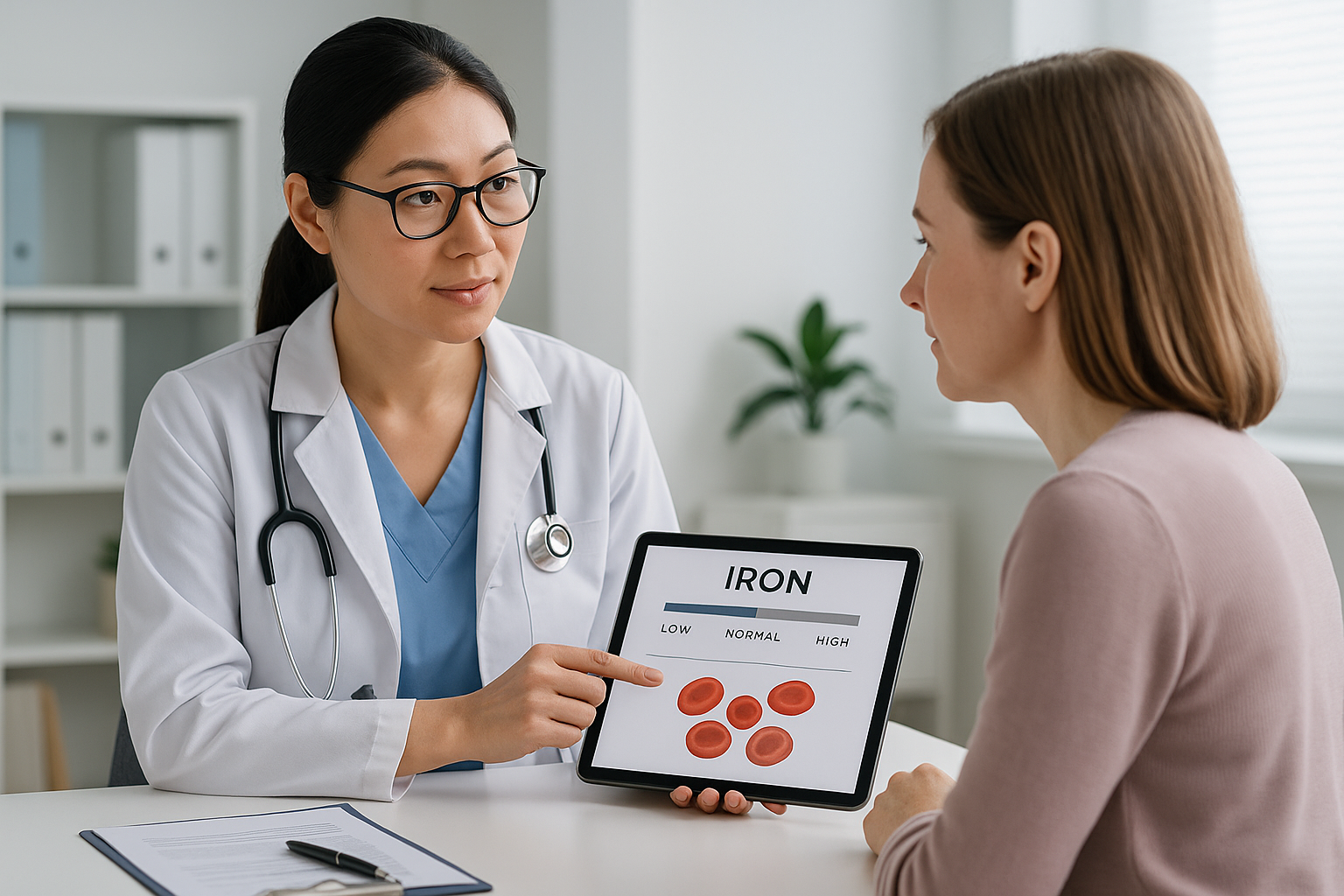Iron is an essential mineral that plays a vital role in carrying oxygen through your bloodstream and supporting the production of energy in your muscles. When iron levels drop, it can affect almost every system in your body, from your immune function and skin health to your energy, focus, and mood.
Restoring your iron levels to an optimal range can help improve energy, reduce fatigue, and enhance your overall sense of well-being.
Common Symptoms of Low Iron
Iron deficiency is one of the most common nutritional deficiencies worldwide. Some people have no symptoms at first, but as levels fall further, they may experience:
- Fatigue or exhaustion
- Pale skin
- Dizziness or light-headedness
- Shortness of breath or chest tightness
- Anxiety or heart palpitations
- Brain fog or poor concentration
- Hair thinning or loss
- Trouble sleeping
If you recognise several of these symptoms, it’s worth discussing with your GP. A simple blood test can check your iron and ferritin levels.
What Causes Iron Deficiency?
Your body needs around 2–8 mg of iron daily to replace natural losses. Iron comes from both animal and plant-based foods, such as red meat, green vegetables, lentils, tofu, and fortified cereals. However, several factors can contribute to deficiency, including:
- Blood loss (for example, from menstruation, surgery, or gastrointestinal bleeding)
- A diet low in iron
- Poor absorption (for instance, due to gut conditions such as coeliac disease or inflammatory bowel disease)
- Pregnancy, when iron needs are higher
For women and people who menstruate, typical iron loss is around 25 mg per month (approximately 300 mg per year). In cases of heavy menstrual bleeding, defined as bleeding through clothing, needing to change products every 1–2 hours, or passing large clots, losses may double.
How Can I Increase My Iron Intake?
You can support your iron levels through dietary choices and lifestyle adjustments:
- Include more iron-rich foods such as lean red meat, chicken, fish, leafy greens, legumes, and iron-fortified grains.
- Add vitamin C–rich foods (like citrus, tomatoes, and capsicum) to help boost absorption.
- Avoid tea and coffee with meals, as they can reduce iron absorption. Enjoy them between meals instead.
Are Iron Tablets Enough?
Oral iron supplements can be effective for mild deficiency, but they often cause gastrointestinal side effects such as constipation, nausea, or abdominal cramps. Because iron absorption from tablets is slow, it can take 3–9 months to fully restore your levels.
By comparison, an iron infusion can safely deliver up to 1500 mg of iron in a single session, a significantly faster and more efficient way to correct deficiency, especially when symptoms are more severe or oral supplements aren’t tolerated.
Why You May Be Recommended for an Iron Infusion
If your GP has recommended an iron infusion, it means your blood tests show significant iron deficiency or that your body’s needs exceed what oral supplements or diet alone can supply.
An infusion may also be advised if you need to restore iron quickly, for example:
- After blood loss or surgery
- Before a planned operation or pregnancy
- When fatigue and other symptoms are impacting your daily life
At Clarendon Medical, our iron infusions are administered safely in a calm, clinical environment by experienced practitioners. Patients often report improvements in energy, mood, and focus within days to weeks following treatment.
FAQs
Q1: How is iron deficiency diagnosed?
A1: A simple blood test can measure haemoglobin, ferritin, and transferrin saturation levels. Your doctor will interpret these results to confirm whether your iron levels are low and discuss the most appropriate treatment options.
Q2: Can diet alone correct low iron levels?
A2: For mild deficiency, increasing iron-rich foods and improving absorption with vitamin C can help. However, moderate to severe deficiency often requires oral supplements or iron infusions prescribed by a healthcare professional.
Q3: How long does it take to feel better after an iron infusion?
A3: Many people notice improved energy, focus, and mood within a few days to a few weeks after treatment, though results vary depending on individual needs and baseline levels.
Q4: Are there side effects to iron infusions?
A4: Most people tolerate iron infusions well. Minor effects such as temporary fatigue or bruising at the injection site can occur. Your clinician will monitor you during and after treatment to ensure your safety.
Q5: How can I maintain healthy iron levels after treatment?
A5: Eating a balanced diet that includes lean meats, fish, leafy greens, and legumes can help. Your GP or clinician may also recommend regular check-ups and follow-up blood tests.
Disclaimer
This information is provided for general educational purposes only and should not replace individual medical advice. Always consult a qualified healthcare professional for diagnosis, treatment, and personalised medical guidance.



